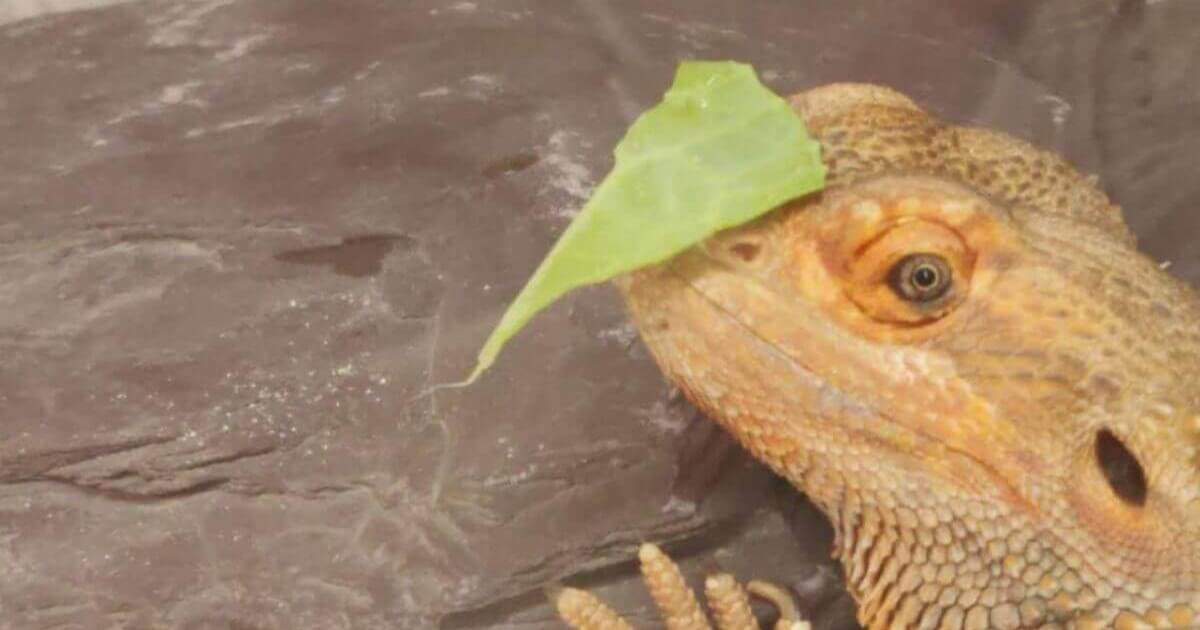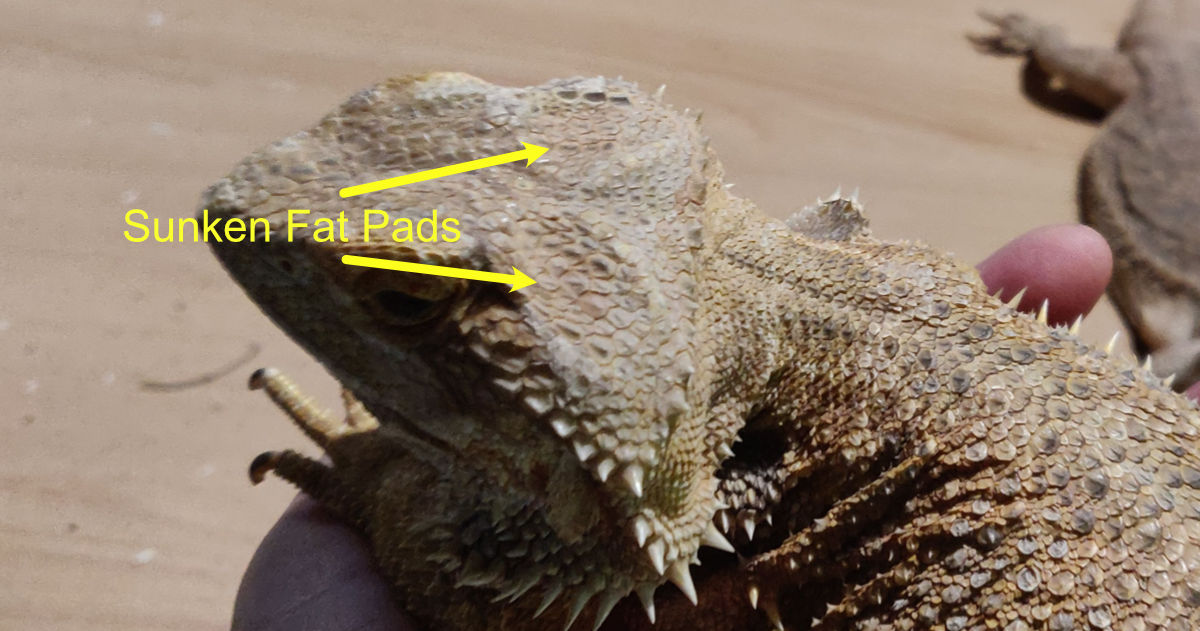How Long Bearded Dragons Can Go Without Food
Learn how long bearded dragons can go without food and whether baby bearded dragons should go without eating at all.

Last Updated: August 20th, 2022
By: Steve
Table of Contents
An adult bearded dragon can go up to two months without food – but it depends on why they’re going without eating. Baby bearded dragons should not ever go without food.
How Long Can A Bearded Dragon Go Without Eating?
Adult bearded dragons will often go without eating for quite some time. Many owners worry if their bearded dragon stops eating for just a few days. There is nothing to worry about for this short period of time.
A healthy adult bearded dragon can go without eating for up to several months. They are reptiles and reptiles are built to survive the lean times when there is no food available. This is particularly so in the Australian Outback where these little lizards originate.
Bearded dragons will store food reserves in good times just in case that food source disappears. This happens regularly in Australia of course, as swarms of locusts might appear at times throughout the year and then disappear again. These food reserves are stored as fat in the bearded dragon’s head area and around their tail. These are known as their fat pads. Very often during the lean times, often in winter, the bearded dragon will go into a process called brumation which is where your bearded dragon will go to sleep until it’s likely that food might return.
But, just because they can go without food doesn’t mean they should. Wild bearded dragons who go through this boom and bust cycle of food don’t live as long as captive bearded dragons and part of that reason is that captive bearded dragons shouldn’t have to rely on using and replenishing their fat-pads. Doing so is likely to put pressure on other organs and it’s far better for their longevity for bearded dragons to eat vegetables every day and insects at least once a week. Baby bearded dragons of course, should eat insects every day.
Find out why a bearded dragon might stop eating.
Baby Bearded Dragons Should NEVER Go Without Food
We would recommend a baby or juvenile bearded dragon does not go without food for more than 3 days. Preferably not even more than 1 day.
The metabolic requirements of a baby or juvenile bearded dragon are very different from an adult bearded dragon. An adult bearded dragon, as we mentioned can go without eating for up to 2 months with no likely detriment.
A baby bearded dragon cannot survive this long without food. This is because a baby / juvenile bearded dragon is constantly growing and to do that they require constant protein and calcium input. If they go without food for more than a few days you should contact your Vet to find out if something else is wrong (hint: there will be something else wrong).
Find out why your bearded dragon is not eating here.
Guidelines For How Long A Bearded Dragon Can Go Without Food
The following table goes through some scenarios to give you some guidelines for how long an adult bearded dragon can go without food.
| Scenario | Duration Without Eating |
|---|---|
| Normal, Healthy Adult | Up to 2 weeks |
| Brumating Adult | Up to 2 months |
| Adult On Medication | Seek Vet Advice |
| Adult With Parasites | Seek Vet Advice |
| Adult With MBD | Up to 1 week – but seek Vet Advice |
| Adult Post Any Surgical Operation | Seek Vet Advice |
| Adult With Diarrhea | Up to a couple of days. Seek Vet Advice |
| Baby | No more than 3 days. Seek Vet Advice. |
Beware The Brumation Trap
Reptiles are ectothermic so do not rely on food intake to maintain body temperature. Consequently they do not have to eat as frequently as birds and mammals. In the wild they are also capable of long periods of physiological starvation during times of drought, temperature extremes, food shortage and hibernation. Unfortunately many pet owners assume their pet is undergoing this physiological hibernation / brumation when the pet is actually starving due to illness or poor husbandry. Consequently reptiles are often presented to veterinary clinics in an advanced state of debilitation.
Reptiles are commonly kept under suboptimal conditions leading to stress and maladaptation. Common causes are inappropriate food, low temperatures and competition from tank mates. Food of appropriate size and familiar colour are often not provided.
Bairbre O’Malley, MVB, CertVR, MRCVS, Bairbre O’Malley Veterinary Hospital, Nutitional Problems In Reptiles
(Emphasis ours)
Nutritional Problems in Reptiles – WSAVA2008 – VIN
How To Tell If A Bearded Dragon Is Starving
Most bearded dragons in captivity are actually clinically obese. They’re overfed and under-exercised.
We recommend weighing your bearded dragon on a set of kitchen scales once a week or so, particularly if they’re not eating at the moment. If their weight starts to drop by more than a few grams it might be time to see the Vet. But get used to your bearded dragon’s habits.

To see if a bearded dragon has enough fat reserves, you can look at the tops of their heads. They should have nice, fairly prominent little pads on the tops of their heads above but just behind their eyes. If you’ve ever had a baby you can think of these in a similar way to the fontanelle on a baby’s head (they’re physiologically different, but look similar).
A bearded dragon that is starving will have flat or even sunken fat pads on the top of their heads. This can also be a sign of dehydration. Bearded dragon’s also have fat pads on either side of the base of their tails. They’re not so easy to see as the fat pads on their heads but they can be felt quite easily.
You can gently grip the sides of the tail between your thumb and forefinger, just behind their rear legs. If there is not enough fat in the tail fat pads the base of the tail will feel thin, the skin may feel saggy, and you’ll be able to feel the bone of the tail easily. A healthy dragon will feel soft at this point, but not saggy.
Summary
In this post we’ve looked at how long bearded dragons can go without eating. We’ve also looked at how long a baby bearded dragon can go without eating. We noticed that adults can go a lot longer without eating than babies can. Indeed, babies should not go without eating for more than 3 days.
We also learned that just because a bearded dragon can go without doesn’t mean that it should do so, but this depends on the reasons why.
If you’re at all unsure how long your bearded dragon should be going without food, or there’s any doubt as to why they’re not eating you should contact a vet as soon as you can. Our advice, as always, is generic in nature and only intended as a guide. For something such as this, veterinary advice is especially important.
We hope you’ve found this post useful. If you have, please feel free to share it with your friends using the buttons below. If you have any questions or follow-up comments or would like to share your experience with how long a bearded dragon can go without food then please leave us a comment using the form below.
Thanks for reading!
